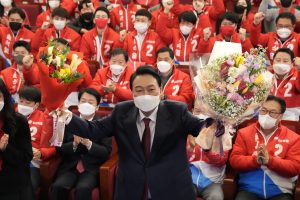Earlier this month South Korea elected Yoon Suk-yeol of the conservative People Power Party (PPP) its next president, by a margin of less than 1 percent. The contentious election was rife with pandering, issue-baiting, and mudslinging. South Korean voters resented the fact that they were forced to choose between two unlikable candidates. Moreover, the campaigns revealed – or perhaps fueled – deep social divisions in the country.
Yoon has both the opportunity and challenge to reform the presidency in South Korea. In this sense the outcome of the election is a strong test for South Korea’s democracy. To prevent democratic backsliding and foster the domestic “regime change” that he promised, Yoon has two important tasks vis-à-vis domestic politics in front of him: mending emergent social divisions and making institutional changes to prevent – not just punish – corruption.
Partisan Politics and Social Divisions
First, President-elect Yoon will need to address the country’s widening political fault lines. Historically, South Korean voters divide along regional lines. Partisan regionalism has roots in the authoritarian rule of Park Chung-hee (r. 1963-1979), who drew support, staff, and advisers from his home region of Yeongnam, the southeastern provinces. Opposition to Park and the progressive foundations of the democratization movement rallied in Honam, the southwestern provinces. This “South-South divide” (Namnam galteung) also manifested in this year’s election, particularly among Koreans aged 40 and older.
However, much more pronounced were divisions by generation and gender. The so-called gender conflict (jendeo galteung) suggests that gender issues need to be addressed for both men and women. For Koreans in their 20s, support for the two major party candidates divided along gender. Around 60 percent of Gen Z women supported progressive candidate Lee Jae-myung of the Democratic Party, while 60 percent of their male counterparts supported Yoon.
One of Yoon’s more contentious promises was to dissolve the Ministry of Gender Equality and Family (which in Korean is named the Ministry of Women and Family, or Yeoseonggajokbu). Yoon found success in courting the young male vote, following the lead of PPP leader Lee Jun-seok. Korean men in their 20s and 30s have rallied against what they see as reverse discrimination stemming from feminism and women-focused policies.
Though Lee lost the presidential election, the Democratic Party retains control of the National Assembly. Despite the executive branch having broad discretionary powers to make policy outside and within the legislature, Yoon will need National Assembly approval to dissolve the office. And despite the proposal getting viral attention in January and February, a week after the election this proposal had already met opposition even within his own party.
Political Corruption: Reform or Retribution?
Second, Yoon needs to gain public trust by living up to his promise to mend the country’s wounds. In his victory speech, Yoon aimed to set a tone that he would win gracefully. “Our competition is over for now… We have to join hands an unite into one for the people and the country,” he said.
Yoon is a newcomer to politics, having spent most of his career as a public prosecutor. He played a central role in several high-profile cases, including the attempt of the National Intelligence Service to influence the 2012 election and the impeachment of Park Geun-hye, the previous conservative president, in 2017. Yoon, who was appointed by outgoing President Moon Jae-in, also investigated Moon’s cabinet officials, including his close adviser and briefly-serving justice minister, Cho Kuk.
South Korean modern history is littered with corruption. Every president since democratization in 1987 has been implicated in corruption or bribery scandals. But the tendency in the country’s strategy has been to target individual perpetrators rather than tackle the difficult but necessary structures and institutions that not only permit but encourage corruption and duplicity. Many in South Korea see Yoon, the former prosecutor, as a symbol of justice and fairness following decades of scandals, lies, and corruption.
Yoon’s campaign promised to investigate the alleged wrong-doings of the Moon administration – a promise that drew cheers from his supporters and set off alarms within the ruling party. Yoon will walk a thin line between investigating specific instances of corruption and using anti-corruption campaigns as cover to punish erstwhile political rivals.
South Korean Democracy Going Forward
One thing is certain: South Korea’s standing as a procedural democracy is in fine order. Over 77 percent of eligible Koreans voted in the March 9 election, the second highest rate since democratization (and just barely short of the record of 77.2 percent turnout, set in 2017). However, scholars have argued that over the past decade or so, South Korea has experienced a decline in other important characteristics of democracy, including freedom of expression, judicial constraints on the executive branch, and erosion of civil society participation.
As I wrote for The Diplomat in following the impeachment of Park Geun-hye in 2017, the question for South Korean democracy at the time would be whether Park was scapegoated for corruption and abuse of power or whether her impeachment would lead to broader institutional reforms to check the power of the presidency. In many counts, we’re back to these same stakes five years later.

































